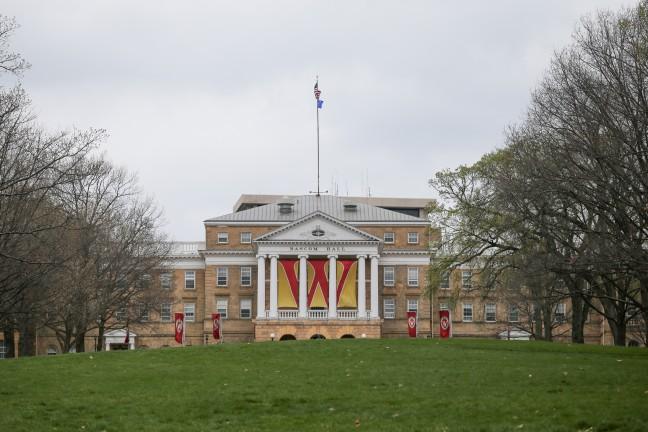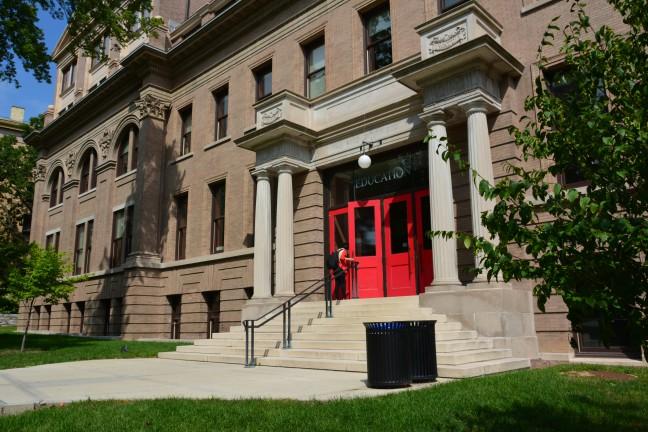
While members of the campus community remain divided on whether ex-Chancellor Biddy Martin’s resignation marks the end of an era or an inevitable action after a polarizing battle, Martin’s influence will remain even after her departure.
After her June 14 announcement that she would be departing the campus to assume the presidency of Amherst College, the former chancellor confirmed the appointment of several leadership roles at the University of Wisconsin and made a tuition proposal to the Board of Regents.
Although Martin’s critics have charged that the proposal – which holds students from families with an income of less than $80,000 exempt from the tuition increase – preempts a decision that should be made by her permanent successor, Martin maintained the plan follows up on her earlier financial aid initiatives.
In a recent interview with The Badger Herald, Martin said her plan to use money from the 5.5 percent increase in tuition for need-based financial follows up on the Madison Initiative for Undergraduates and is “completely consistent with [her] priorities.”
She added the proposal mirrors an original provision in the New Badger Partnership.
While Martin acknowledged the final decision would be made after her departure, she characterized the proposal as a “placeholder” to avoid tabling the issue until after students have already enrolled in September.
“In the past, neither the System nor the Regents have necessarily supported using the tuition increase to hold harmless,” Martin said.
The outgoing chancellor also recently confirmed the hiring of Francois Ortalo-Magne as the new dean of the business school, along with Margaret Raymond as law school dean.
Although some have questioned the timing of these appointments as the chancellor begins the transition to Amherst, Martin maintains the appointments are the conclusion of a shared governance search and screen process spanning months.
Having experienced a time of transition during her tenure as provost at Cornell University, she said the schools required strong leadership as the university enters an interim period.
“Waiting a year while we had strong candidates seemed to be a mistake,” she said.
Much of Martin’s final year as chancellor was marked by her statewide campaign for greater operating autonomy for the Madison campus, known as the New Badger Partnership, which evolved into a plan to break UW from the System, as outlined in Gov. Scott Walker’s original state budget.
The Partnership, which was originally made public in October 2010, came under fire when it was revealed Martin had not informed UW System leadership she had met with Walker’s staff about the plan.
While Martin became a key figurehead in support of the controversial plan, she emphasized her decision to leave the university was driven by the career opportunity offered by Amherst.
“It’s impossible to sort anything out, and I probably won’t know that answer until years later,” she said. “It was my feeling that I had pushed things as far as I could at the moment and had a great opportunity [at Amherst].”
The new position will mark a return to Martin’s passion for the liberal arts, which recalls her doctoral study in German, a degree earned at UW in 1985.
While many students will fondly remember Martin for her appearance at snowball fights on Bascom Hill and in the viral hit “Teach Me How to Bucky,” members of the faculty run the gamut of perspectives on how the chancellor may be memorialized.
Judith Burstyn, who chaired the University Committee of Faculty Senate for 2010-11, said she wished the body had maintained a closer working relationship with the chancellor.
She cited the project to reorganize the Graduate School as an instance in which committee members’ institutional knowledge was “disregarded.”
Burstyn, a UW chemistry professor, said while Martin would be remembered for the high profile she held on campus and a strong public persona, she questions whether Martin was an ideal fit for the Madison campus.
“We are an unusual institution with the faculty committed to a system of faculty governance,” she said. “That was not something Martin was familiar with, which was challenging.”
Education and sociology professor Sara Goldrick-Rab, an outspoken critic of the former chancellor’s policies addressing access and affordability, said Martin’s initiatives to increase institutional need-based aid are not as meaningful as campaigns to decrease the net price of education for low-income students.
She also said the controversy surrounding public authority was forced into the academic sphere and interactions with the UW System may have negatively colored professors’ opinions of Martin.
“Her actions with the System undoubtedly did damage when this is all [members of the faculty] know of System,” she said. “Politics were a major distraction last semester.”
Goldrick-Rab also questioned whether making appointments before her departure would effectively “tie the hands” of the next chancellor.
Board of Regents President Charles Pruitt maintained that Martin’s successor should not worry about mending bridges with the UW System.
“We had a very important discussion about the role of Madison in the UW System. I don’t think there are any long term issues,” he said. “This was a Board of Regents that hired her. She was a thoughtful and dynamic leader.”
The chancellor was no stranger to controversy. In April 2010, Martin severed contracts with Nike after students protested against alleged workers’ rights violations at the company’s Honduran factories.
Tom Templeton, an Associated Students of Madison representative, said Martin took students’ opinions very seriously and greatly impacted the undergraduate experience with MIU.
“She really cared about students and looked out for their best efforts,” he said. “[Martin] also challenged and raised the debate about higher education in the state and engaged in student life on a wide range of levels.”
Martin reflected that the hiring of 80 new faculty members using funds from MIU, the university’s unique Chinese Champions academic program and getting the issue of flexibility on a statewide agenda are among her most proud accomplishments during her tenure in Madison.
“The single biggest thing I’ll miss are the students. I really loved interacting with students at UW in settings of work and play,” she said.



















